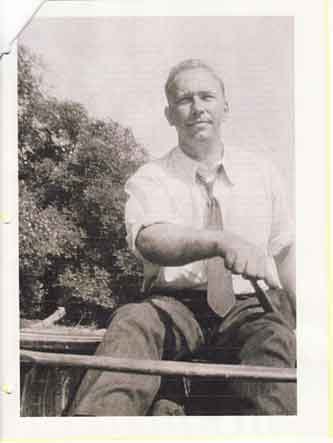Who Was Merrill W. Linn?
“Merrill Linn was born in 1903 in Lewisburg, the only child of Philip and Eleanor Linn, and the descendant of one of the earliest families to settle in the Buffalo Valley. Merrill Linn, and his great-uncle, John Blair Linn, were authors of The Annals of Buffalo Valley and of sections of The History of the Susquehanna and Juniata Valleys. Merrill Linn graduated from Lewisburg High School, Harvard University, and Dickinson School of Law, after which he came back to Lewisburg and began practicing law. Too young to serve in the military in World War I and too old to serve in World War II, he volunteered for the American Red Cross and served as a field officer in France. Other than that stint abroad, he lived in Lewisburg all his life and practiced law until his retirement. He was married twice; he and his first wife, Henrietta Weary Linn, had one son. Henrietta Linn died in 1972. Merrill Linn married Elizabeth Cox several years later; she survived him. He died in 1987, at the age of 83.”
Merrill Linn was an important, but humble, contributor to the local community. He did not look for recognition for his good deeds; however, he “was instrumental in getting funds to build the current Evangelical Hospital; he was solicitor for East Buffalo Township and for two school boards; he served on the board of directors for a bank and the phone company; he was a volunteer firefighter.”
Beyond his community service and his well-known sense of humor and love of practical jokes, Linn was a lover of the out-of-doors: hiking, exploring, canoeing, and birding. He had a special concern for wetlands. “He spent his 18th summer as a canoe guide for the girls at Miss Case’s summer camp, in Algonquin Provincial Park in Ontario, Canada. He studied barely discernible buffalo trails in the woods of Union County; searched for old bear traps on Nittany Mountain; spent blissful days camping alone in the woods. At age 70 he planned a canoe trip down the Susquehanna from above Jersey Shore to his front door on Water Street in Lewisburg. . . .Whenever his wife or friends voiced their worries about him, he told them he always carried a note in his pocket that read ‘if you find me dead, I died happy doing what I love.’ Merrill Linn’s son Bob offered Henry David Thoreau’s words as a way of summing up his father: ‘I went to the woods because I wished to live deliberately, to confront only the essential facts of life, and see if I could not learn what it had to teach, and not, when I came to die, discover that I had not lived.’
“Merrill Linn might not have appreciated being put in the spotlight by having an organization like the Merrill Linn Land & Waterways Conservancy named after him. But he would have appreciated the group’s efforts, and his friends and family could think of a no better tribute to him than to make sure the woods and waters he loved were preserved for all time.”
…from “Merrill Linn, a Man for All Seasons”, by Quica Ostrander


